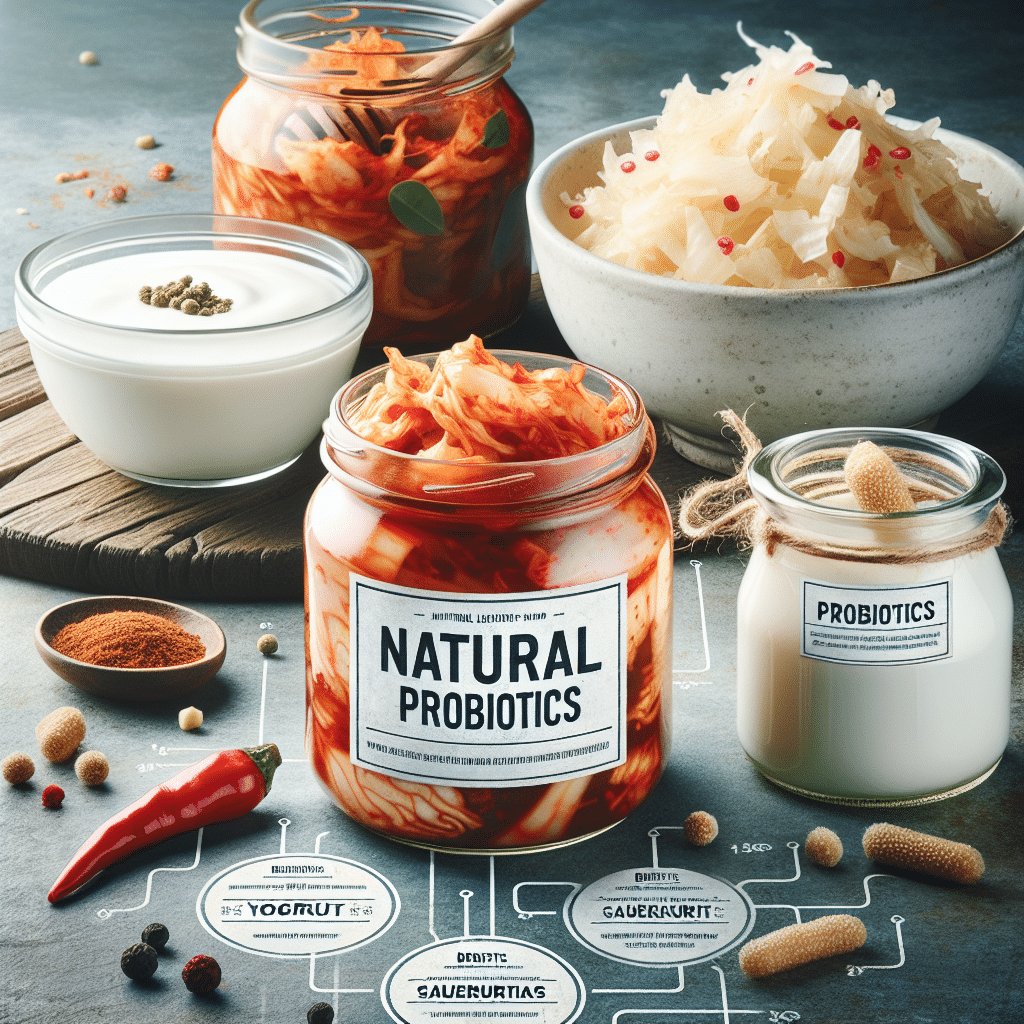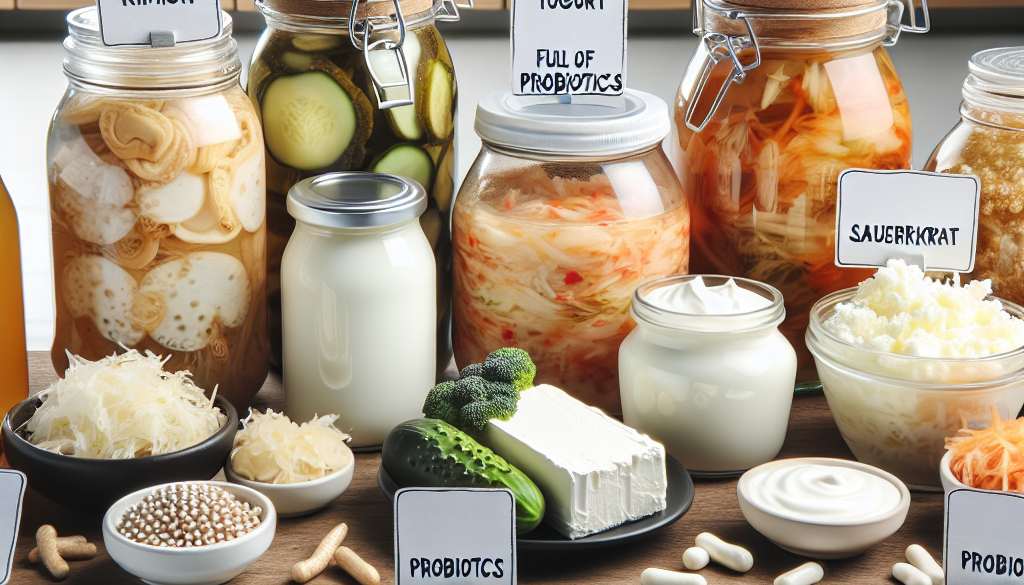Fermented Foods: Probiotics in a Clean Label
-
Table of Contents
- Fermented Foods: Harnessing Probiotics for a Clean Label Lifestyle
- The Rise of Probiotics in Health and Wellness
- Fermented Foods as a Natural Source of Probiotics
- Clean Label Movement and Consumer Demand
- Case Studies and Statistics: The Impact of Fermented Foods
- Challenges and Considerations in Producing Clean Label Fermented Foods
- Conclusion: Embracing Fermented Foods for a Healthier Future
- ETprotein: Your Source for High-Quality Plant Proteins
Fermented Foods: Harnessing Probiotics for a Clean Label Lifestyle

Fermented foods have been a staple in human diets for thousands of years, but their health benefits are making them a modern-day superfood. As consumers become more health-conscious, the demand for clean label products—those with fewer and more natural ingredients—is on the rise. Fermented foods naturally fit into this category, offering a wealth of probiotics that are essential for gut health. In this article, we’ll explore the world of fermented foods, their probiotic power, and how they contribute to a clean label lifestyle.
The Rise of Probiotics in Health and Wellness
Probiotics are live microorganisms that, when consumed in adequate amounts, confer a health benefit on the host. They are most commonly found in fermented foods such as yogurt, kefir, sauerkraut, kimchi, and kombucha. The health benefits of probiotics are vast, including improved digestion, enhanced immune function, and a reduced risk of certain diseases.
- Improved Digestion: Probiotics help balance the friendly bacteria in the digestive system, aiding in the digestion of food and the absorption of nutrients.
- Enhanced Immune Function: A large portion of the immune system is located in the gut. Probiotics can boost immune cells and may help fend off infections.
- Disease Prevention: Some studies suggest that probiotics may reduce the risk of certain conditions, such as irritable bowel syndrome (IBS), certain types of diarrhea, and even some allergies.
Fermented Foods as a Natural Source of Probiotics
Fermented foods are made through controlled microbial growth and enzymatic conversions of food components. This process not only preserves the food but also enriches it with probiotics, vitamins, and minerals. Here are some popular fermented foods and their probiotic content:
- Yogurt: One of the best-known sources of probiotics, yogurt is made by fermenting milk with live bacteria cultures.
- Kefir: Similar to yogurt, kefir is a fermented milk drink but contains a wider variety of bacteria and yeast.
- Sauerkraut: Made from fermented cabbage, sauerkraut is rich in probiotics, fiber, and vitamins C and K.
- Kimchi: A Korean staple, kimchi is made from fermented vegetables and contains a diverse array of probiotics.
- Kombucha: A fermented tea drink, kombucha is not only probiotic-rich but also contains antioxidants.
Clean Label Movement and Consumer Demand
The clean label movement is driven by consumers’ desire for transparency and simplicity in the foods they eat. They are increasingly looking for products with ingredients they recognize and trust. Fermented foods naturally meet these criteria because they are made using traditional methods that do not require artificial additives or preservatives.
- Transparency: Consumers want to know where their food comes from and how it’s made. Fermented foods often have a clear and simple production process.
- Simplicity: Clean label products typically have shorter ingredient lists. Fermented foods are made with few ingredients and rely on natural processes for their preservation.
- Trust: With a growing awareness of gut health, consumers trust fermented foods as a natural source of probiotics without the need for synthetic supplements.
Case Studies and Statistics: The Impact of Fermented Foods
Research and market trends show a significant increase in the popularity of fermented foods. According to a report by MarketsandMarkets, the global probiotics market is projected to reach USD 69.3 billion by 2023, growing at a CAGR of 7.0% during the forecast period. This growth is partly due to the rising consumer interest in fermented foods as a source of natural probiotics.
Case studies have demonstrated the positive impact of fermented foods on health. For instance, a study published in the World Journal of Dairy & Food Sciences found that participants who consumed yogurt regularly had improved lactose digestion and reduced symptoms of lactose intolerance.
Challenges and Considerations in Producing Clean Label Fermented Foods
While the benefits of fermented foods are clear, there are challenges in producing them for the clean label market:
- Consistency: Maintaining a consistent taste and texture can be difficult due to the natural variability in fermentation processes.
- Shelf Life: Without preservatives, fermented foods may have a shorter shelf life, requiring careful handling and storage.
- Regulation: Producers must navigate food safety regulations that are designed for conventional foods, which can be challenging for fermented products.
Conclusion: Embracing Fermented Foods for a Healthier Future
Fermented foods offer a wealth of health benefits, particularly in the form of probiotics. As part of the clean label movement, they cater to consumers’ desire for natural, simple, and transparent food options. With the growing body of research supporting their health benefits and the increasing consumer demand, fermented foods are poised to become a mainstay in diets focused on wellness and natural ingredients.
The key takeaways from this article are the importance of probiotics for gut health, the natural fit of fermented foods within the clean label movement, and the growing consumer demand for products that are both healthy and transparent. As we continue to understand the impact of diet on overall health, fermented foods are likely to play an increasingly significant role in our daily lives.
ETprotein: Your Source for High-Quality Plant Proteins
In addition to incorporating fermented foods into your diet, consider enhancing your nutritional intake with plant-based proteins from ETprotein. Their range of organic and allergen-free protein products, including rice protein, pea protein, and various seed proteins, complement a clean label lifestyle perfectly. Whether you’re formulating new food products or seeking to improve your personal health, ETprotein’s offerings provide the quality and reliability you need.
About ETprotein:
ETprotein, a reputable plant protein vegan protein Chinese factory manufacturer and supplier, is renowned for producing, stocking, exporting, and delivering the highest quality organic bulk vegan protein and plant proteins. They include Organic rice protein, clear rice protein, pea protein, clear pea protein, watermelon seed protein, pumpkin seed protein, sunflower seed protein, mung bean protein, peanut protein etc. Their offerings, characterized by a neutral taste, non-GMO, allergen-free attributes, cater to a diverse range of industries. They serve nutraceutical, pharmaceutical, cosmeceutical, veterinary, as well as food and beverage finished product distributors, traders, and manufacturers across Europe, USA, Canada, Australia, Thailand, Japan, Korea, Brazil, and Chile, among others.
ETprotein specialization includes exporting and delivering tailor-made protein powder and finished nutritional supplements. Their extensive product range covers sectors like Food and Beverage, Sports Nutrition, Weight Management, Dietary Supplements, Health and Wellness Products, and Infant Formula, ensuring comprehensive solutions to meet all your protein needs.
As a trusted company by leading global food and beverage brands and Fortune 500 companies, ETprotein reinforces China’s reputation in the global arena. For more information or to sample their products, please contact them and email sales(at)ETprotein.com today.














